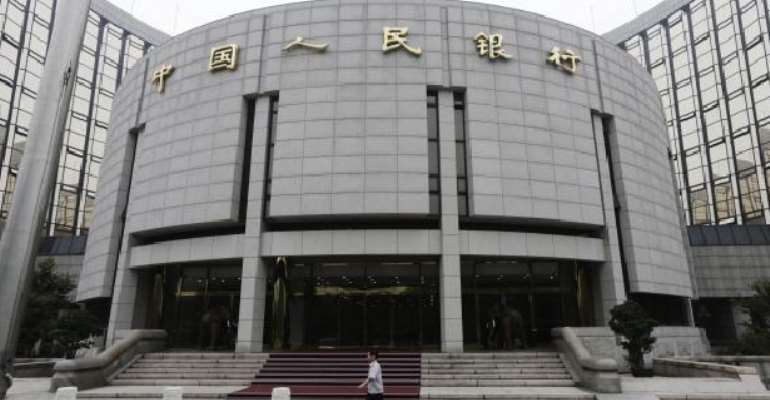China Worries Chill Markets, Copper Slumps

A dizzying fall in copper to a near four-year low compounded increasing concern in China over its economic slowdown on Wednesday to send a wave of unease sweeping through world markets.
World shares fell for fourth day, but it was copper, often seen as a proxy for China's fortunes, that grabbed the headlines as Shanghai futures fell by their 5 percent daily limit again and benchmark prices of the metal slumped to their lowest since 2010.
In Europe, bourses from London to Lisbon .
FTEU3 tumbled in early deals and safe-haven German government bonds were in demand as the jitters compounded the geopolitical tug-of-war between Russia and Kiev and the West over Crimea.
"Markets are watching what is happening in copper, with awe and trepidation," said Societe Generale head of currency strategy Kit Juckes.
"It's partly ongoing concern about Chinese growth (or lack thereof) and nagging worries about the Ukraine.
And partly it is just that the commodity bubble burst last year and not everyone noticed.
" Copper's plunge comes in the wake of China's first domestic bond default which has sparked concerns about the potential unraveling of loan deals where the industrial metal has been used as collateral.
The metal has been in freefall for the last three days but the worries finally appeared to be catching up with other parts of the market.
Stocks across Asia, although ironically not China, had seen sizable falls, while the Australian dollar and the Chilean peso and South Africa's rand, currencies highly sensitive to commodities, all buckled.
The aussie was last down 0.
25 percent at $0.
8960 though traders said it could have been a lot more had it not been for demand created by a big AUD$7 billion bond sale.
Japan's Nikkei .
N225 retreated 2.
6 percent, continuing the see-saw pattern of the last couple of months, while Australian stocks shed 0.
6 percent .
AXJO.
MSCI's broadest index of Asia-Pacific shares outside Japan .
MIAPJ0000PUS fell 1.
2 percent.
That mirrored a lackluster performance on Wall Street, where soft data left investors no wiser on whether the U.
S.
economy's troubles were merely weather-related or something more worrisome.
CHINA CHILL Economists worry that recent moves by China to stamp out speculation on its rising currency and overly easy lending may have overshot, adding to the broader strains on emerging markets.
The FTSEurofirst 300 .
FTEU3 index of top European shares was down 0.
9 percent at 1,308.
74 points by 0930 GMT, also dragged down by a 1.
7 percent drop in European basic resources stocks .
SXPP dominated by mining firms.
.
EU Investors were hoping Chinese data on industrial output, retail sales and urban investment on Thursday might offer some clarity on where the economy is heading.
One potential positive was a Reuters report that China's central bank is prepared to re-loosen monetary policy if economic growth slows further by cutting the amount of cash that banks must keep as reserves.
Citing sources involved in internal policy discussions, the report said an easing would be triggered if growth slips below 7.
5 percent, and would come on top of money market operations and currency intervention via state banks that traders say has already loosened monetary conditions overall.
In the meantime, caution was the watchword as concerns about the state of Chinese demand continued to pressure industrial commodities.
At least one U.
S.
scrap copper trader has suffered "large" losses after a buyer in China defaulted on a deal in the past week, one of the first signs that sinking prices and tightening credit are taking a toll on the physical market.
"Copper prices continue to slide on concerns that the cyclical metal may face tough times as China slows and rebalances away from investment into consumption," said analysts from Barclays in a note.
CONFIDENCE WOBBLE With the jitters starting to eat into broader confidence, U.
S.
government bonds began to gain after days of treading water.
The dollar eased a touch on the yen to 102.
97 as the Japanese currency also benefited.
Gold, another traditional favorite of risk adverse investors climbed to its highest in 5-1/2 months as it reached $1,362.
25 an ounce.
Oil prices extended their pullback with Brent crude off 65 cents to $107.
20 a barrel, while U.
S.
oil lost $1.
34 to $98.
69, it's lowest in a month and a half.
"The question in everybody's mind is - what is the biggest risk to oil? And it is China slowing down," said Jonathan Barratt, chief executive of commodity research firm Barratt's Bulletin in Sydney.
"People have figured out that what happens in Ukraine doesn't matter to oil markets so much.
It may impact other commodities, but not so much oil.
" REUTERS
